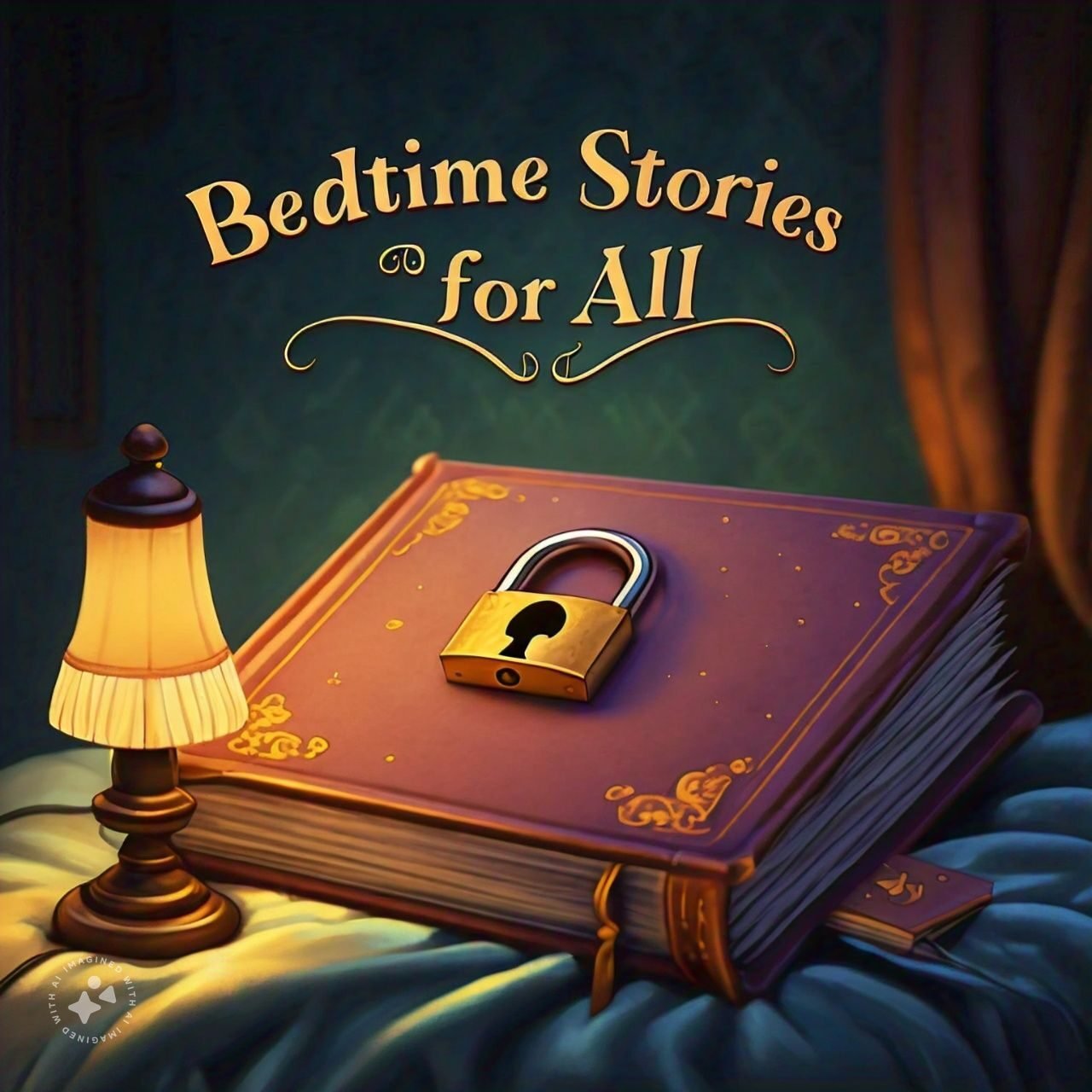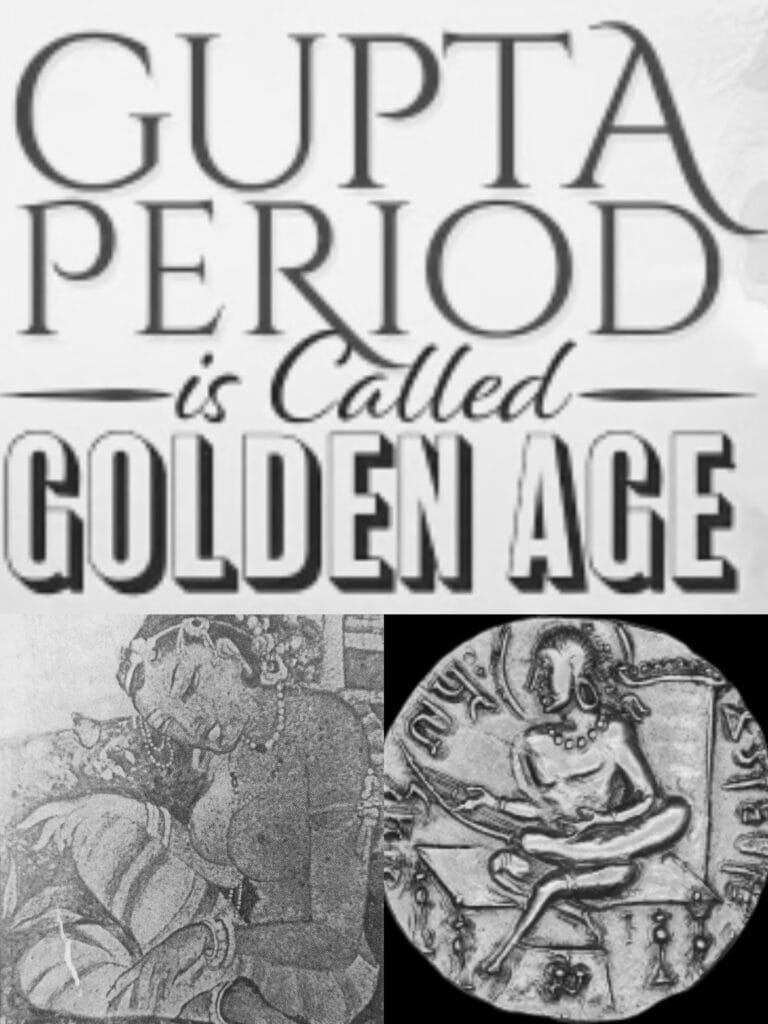Following Betal’s escape, King Vikramaditya returned to the peepal tree where Betal was hanging upside down on one of the branches. Vikram pulled the corpse onto his shoulders and headed towards the cremation ground.
On the way, Betal said, “Vikram, the journey is very long and tiresome. So, to ease your burden and lighten your mood, let me tell you another interesting story. Listen to it quietly and answer my question at the end of the story.”
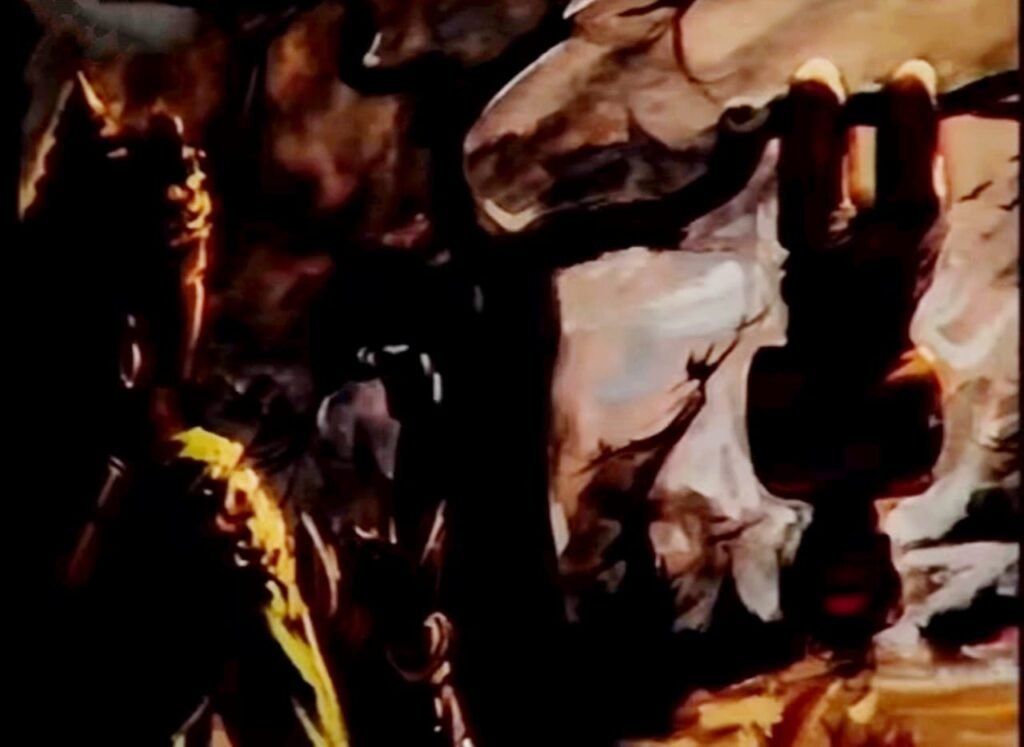
Betal began his story:
Long ago, Emperor Samudragupta ruled the Gupta Empire. His reign is often associated with the “Golden Age of India” due to remarkable progress in various fields such as arts, literature, medicine, astronomy, mathematics, science, and technology. Beyond his military prowess, Samudragupta was a patron of the arts and literature, contributing to the flourishing of Sanskrit literature and Hindu rituals. Emperor Samudragupta was proficient in playing the veena. He issued several gold coins depicting him playing the instrument, which served as currency within his Gupta Empire. Administrative efficiency was marked by various welfare schemes and policies that brought prosperity and happiness to his subjects and his kingdom.

There were two loyal and gifted ministers in the service of Emperor Samudragupta named Harisena and Virasena. Harisena had the ability to judge people’s character and intentions by keenly observing them, whereas Virasena had the ability to touch and smell things and predict the properties and nature of those objects. Emperor Samudragupta never made any important decisions without consulting Harisena and Virasena.
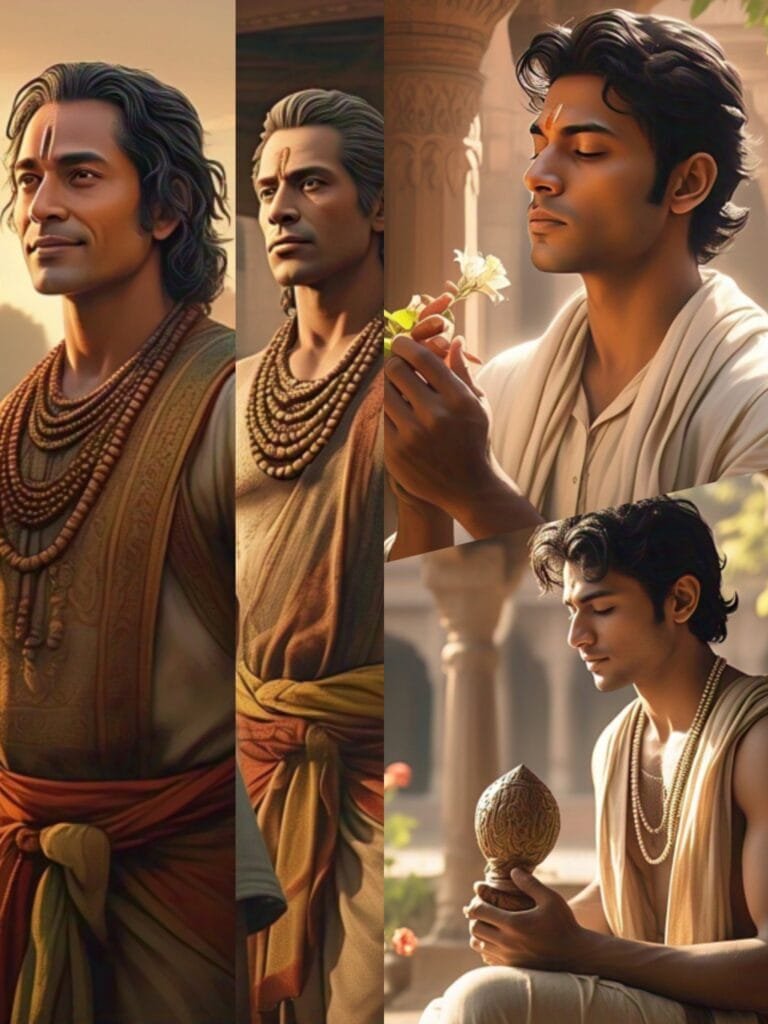
One day, King Vyaghraraja of neighboring Mahakantara sent a letter proposing friendship between the two kingdoms. Emperor Samudragupta wanted to verify King Vyaghraraja’s intentions. Therefore, he summoned his two gifted ministers, Harisena and Virasena, and commanded them to visit Asurgarh, the capital of Mahakantara, as envoys of the Gupta Empire.
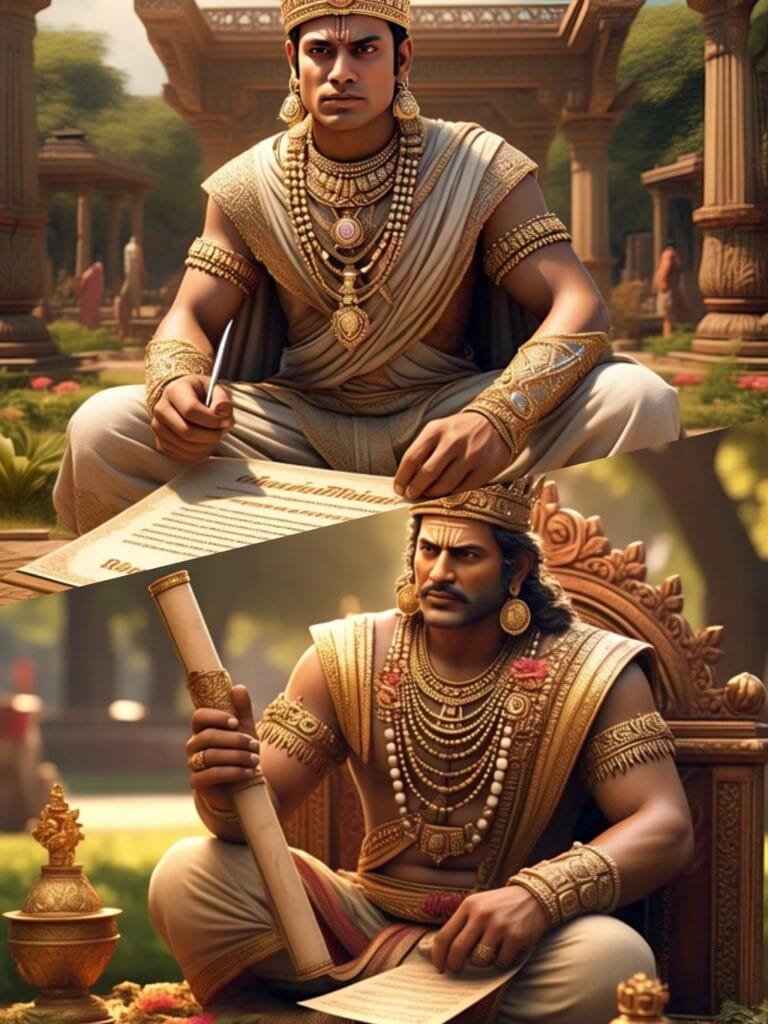
Upon reaching Asurgarh, gifts and greetings were exchanged between the envoys of the two kingdoms. Then Harisena and Virasena were taken to the court of King Vyaghraraja, who offered them his hospitality. During their brief stay, Harisena and Virasena gathered valuable information needed to understand the motive behind the friendship proposal. Before returning to the Gupta Empire’s capital, Patliputra, the envoys thanked King Vyaghraraja for his hospitality and took their leave.
At Patliputra, Harisena and Virasena visited the palace of Emperor Samudragupta, where, in one of his chambers, Samudragupta was playing the veena. Seeing his ministers waiting for him, Samudragupta put down his veena and inquired about their visit to Asurgarh.

Harisena said, “O Emperor Samudragupta, King Vyaghraraja is a great king, but we sensed his jealousy towards the prosperity of our Empire, which makes him your foe.”
Emperor Samudragupta then turned towards Virasena and asked, “Virasena, what’s your take on this matter?”
Virasena said, “Your Majesty, Harisena is right, but we should accept the offer of friendship with caution, as we will need the military assistance of King Vyaghraraja in our campaigns in the southern regions of India. Not to forget that Mahakantara is also a rich kingdom.”
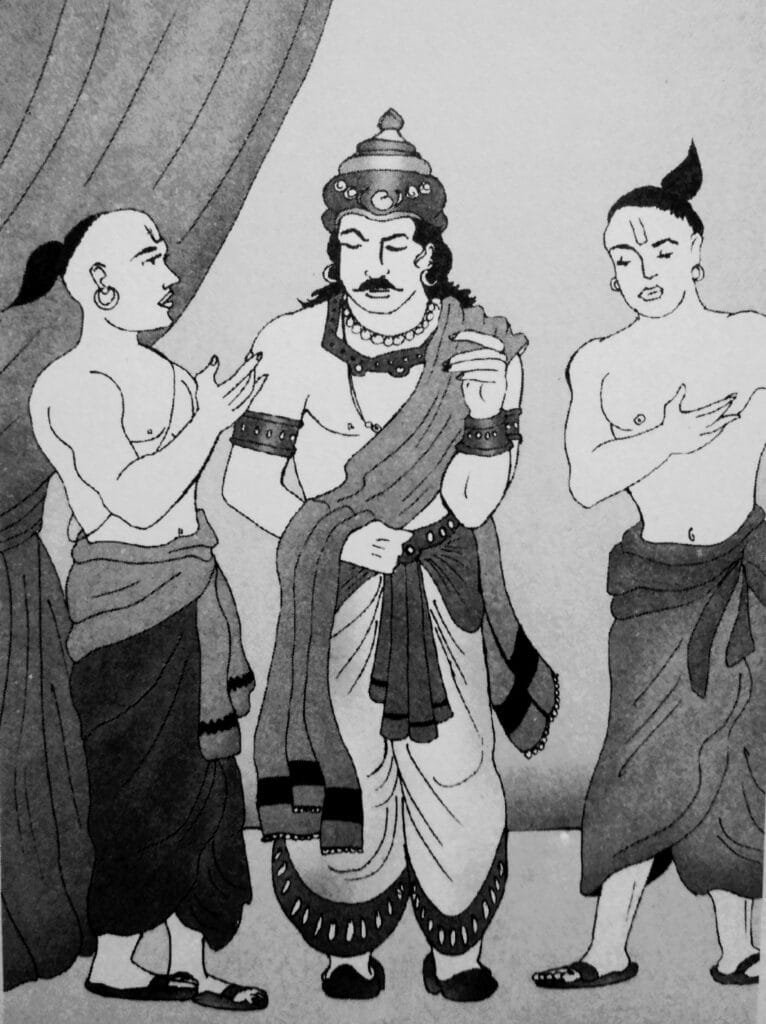
Sensing the logic in Harisena and Virasena’s reply, Emperor Samudragupta proceeded to accept King Vyaghraraja’s friendship offer, but with caution.
After a couple of months, King Vyaghraraja of Mahakantara invited him to a banquet. Emperor Samudragupta accepted the invitation and, on the day of the banquet, arrived at Asurgarh with his two trusted ministers. This time, King Vyaghraraja personally came to meet them, and after the formal greeting ceremony, he took them to his palace for the royal banquet.
When the grand banquet was over, Emperor Samudragupta and his ministers were taken to the royal chamber for some much-needed rest. As Emperor Samudragupta was about to lie down on the bed, Harisena cautioned him and said, “O Emperor Samudragupta, I think that pillow is dangerous, and I request you to allow Virasena to check it.”

Samudragupta granted the request, and Virasena began his investigation. He checked the pillow thoroughly but was not satisfied with his efforts. Then he tore open the pillow to investigate further. There, he saw strands of some animal hairs. Upon touching and smelling them, Virasena said, “Your Majesty, Harisena is right. This pillow is stuffed with poisonous hairs from an animal. Had you lain down on this pillow, those poisonous animal hairs would have pierced your skin and instantly killed you.”

Emperor Samudragupta was alarmed, and in the middle of the night, they escaped from the palace without drawing any attention to themselves. They reached the capital of Patliputra safely in a couple of days.
To teach King Vyaghraraja a lesson, Emperor Samudragupta planned a fresh attack on the Kingdom of Mahakantara. The responsibility to lead the Gupta Empire’s army was entrusted to Harisena and Virasena, whose superior battlefield strategy and forces decimated King Vyaghraraja’s army on the battlefield.
Samudragupta knew that it would be unwise to control such an ever-expanding Gupta Empire directly, so he allowed the defeated King Vyaghraraja to retain his throne by annually paying tributes and showing sincere loyalty to the Gupta Empire.

Thus, the kingdom of Mahakantara, under the rule of King Vyaghraraja, became a feudatory of the mighty Gupta Empire.
Betal ended his story and asked the king, “Which of these two ministers was the wiser?”
Dear Readers, whom do you consider the wisest among these two ministers? Is it Harisena, or is it Virasena? Be certain of your choice before you read Vikramaditya’s reply.

Vikram thought for a while and said, “The wiser of the two ministers is Harisena because he sensed that the pillow was dangerous for Emperor Samudragupta, whereas Virasena only acted when asked by the Emperor to check the pillow. After thoroughly examining it by touching and smelling, Virasena warned the Emperor of the danger, proving Harisena right. Harisena’s timely advice saved Emperor Samudragupta’s life.”
Betal said, “You are spot on once again. Your reputation for making wise judgments remains intact. However, you made the mistake of speaking, and you know the consequence of it, King Vikramaditya.”
Betal flew into the sky while the enraged King Vikram followed him back to the peepal tree.
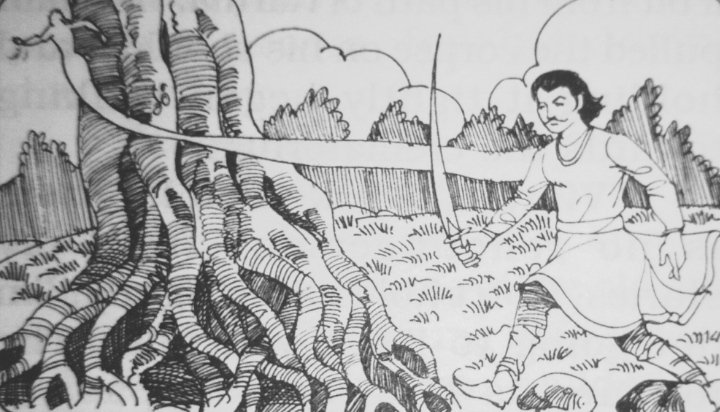
- 14 Best Panchatantra stories in hindi
- 15 Best Children Stories in English from Panchatantra 2.0
- 16 Best Aesop's Fables in Hindi with moral lessons
- 17 Best Aesop's Fables with moral lessons for children
- Arabian Nights
- Author's Best Written Stories in English
- Author's Best Written Stories in Hindi
- Baital Pachisi बैताल पचीसी in Hindi
- Bedtime Stories for All
- Hindi Love Stories
- Love and Romance
- Vikram and Betal series: Riddle Solving Stories
You can join my WhatsApp Channel by clicking the link here
